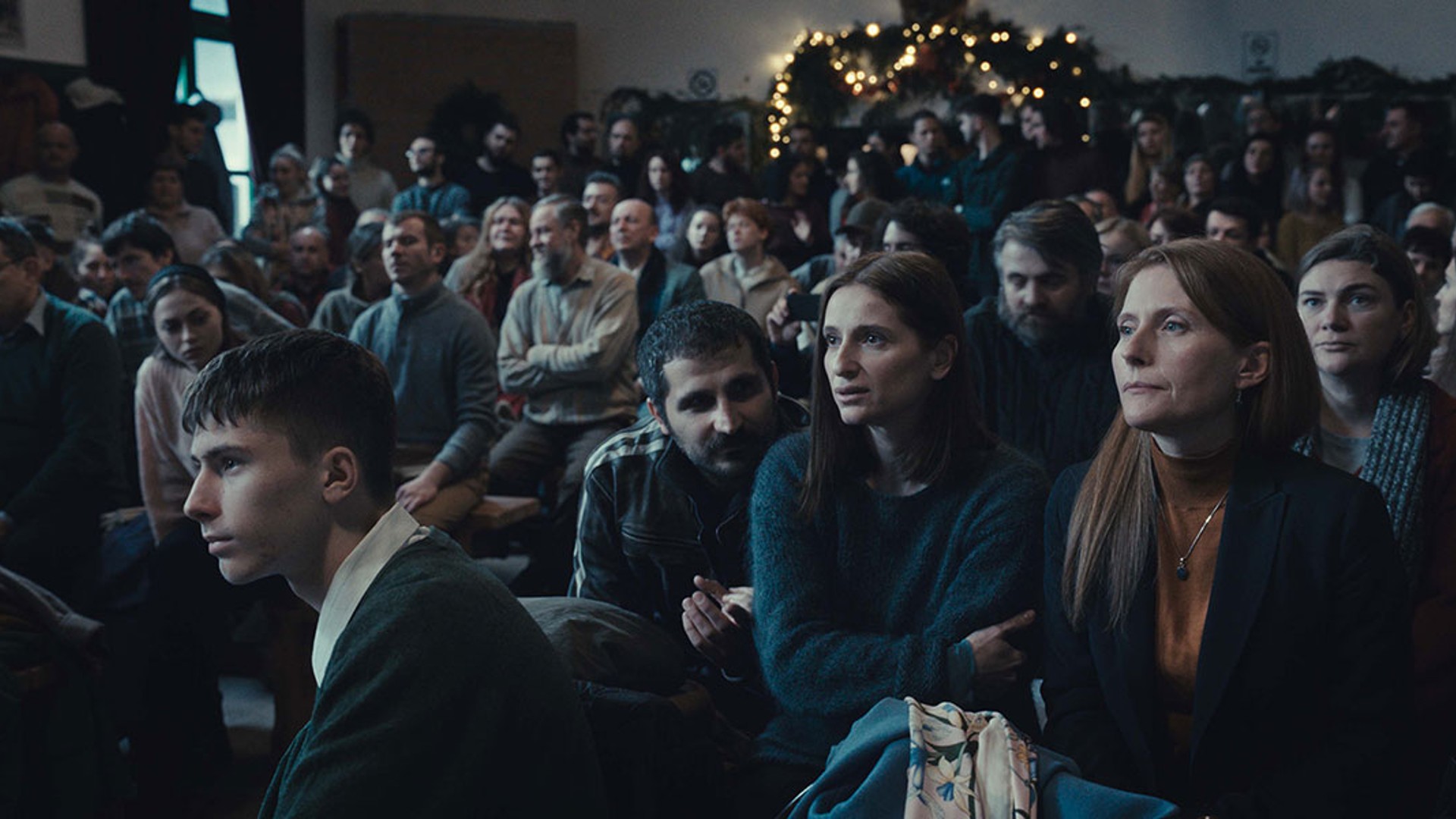If ever one needed proof that the world is desperate to return to The Way Things Were, it could be found in the opening hours of the Toronto International Film Festival. It’s practically the official theme of the fest’s 47th year, its first fully in-person edition since the start of the pandemic in 2020. “The movies are back and so are we” is the motto screamed, in so many words, by the usual reel of prescreening bumpers and the programmers crossing stages to introduce each new selection.
That messaging was mirrored by a general glee that passed like an electric current through each venue, lobby, and line. Everyone seems elated to be back — and willing to pretend that all is as it used to be at North America’s largest annual gathering of movie lovers. Here’s hoping, of course, that excitement is the only thing that spreads wildly in this sea of grinning, mostly maskless faces; the absence of mandates is a less heartening illustration of everyone’s desire to party like it’s 2019.
Still, I am excited, too. After two “hybrid” years in which I virtually experienced the festival from the safety and comfort of my living room, it is good to be back on the ground, and to once more experience all the tangible traditions of the fest. The meals with friends you see only a couple times a year, or even less frequently during these unusual times. The strolls down Toronto avenues that break up long stretches in darkened auditoriums. And the most singular rite of TIFF passage: Ascending that endless, often on-the-fritz escalator at the Scotiabank, which has the tendency to — in the immortal words of Mitch Hedberg — become stairs.
And of course it’s amazing to see so many movies projected onto a big screen again; I’d gladly climb a skyscraper’s worth of steps to get to a line of waiting seats at the top. The allure of the temporarily dormant movie theater experience made its way into the opening-night remarks of Cameron Bailey, eternally poised CEO of the festival and one-man ambassador of flattery. (“The best movie audience in the world” is what he called all of us last night, which made me think of Waylon Smithers behind the mic at the monster truck rally: “They’re already here, we don’t need to keep hustling them like this.”)

The irony of all this “back to the cinema” cheerleading is that the festival has, for not the first time, chosen a Netflix movie as its opening night selection. And setting aside the threat the streaming giant actively poses to movie theaters, the movie itself, The Swimmers, was unsightly projected on the enormous screen of the Roy Thomson Hall. As bright and flat as a postcard, the cinematography brought to mind less prestigious productions like The Kissing Booth, helpfully contributing to a unified theory of “the Netflix aesthetic.” Every image looks like it was shot to potentially serve as the preview thumbnail.
The film is just as dramatically textureless. It retells the true story of sisters Yusra and Sara Mardini, teen swim champs from Damascus, Syria, whose dreams of going to the Olympics were disrupted in the mid-2010s,by the Syrian War. Eventually, the two fled for Germany, in hopes of escaping the violence and continuing to chase their athletic aspirations. The journey would take them across land and sea, through multiple countries, where their lives and freedom were frequently threatened, until … well, you either know how this true story of perseverance ended or you don’t. I’ll let Wikipedia spoil the uplifting upshot.
You’d have to be heartless not to be moved by the details of the Mardini sisters’ plight, but also very forgiving to ignore what a blandly virtuous account writer-director Sally El Hosaini (My Brother the Devil) has made from them, with no particular perspective beyond simple admiration. She keeps doling out little inspirational moments along the way, like an Olympic competitor coming up for air in the pool; one wonders if these incongruous pop-music montages have been algorithmically mandated, as they feel like concessions to the assumption that subscribers will click away if confronted with too much struggle over two-and-a-half hours. There’s scarcely a moment in the movie that hasn’t been engineered to tug at heartstrings, which is a shame because the film’s stars, real-life sisters Nathalie and Manal Issa, don’t seem in need of the nervous orchestral backup. They could carry the emotion without it.
Both narratively and stylistically, The Swimmers trends constantly toward tacky cliché, like the flashes of voice-over tutelage from the girls’ father/coach (“Find your lane. Swim your race.”) as they’re forced to put their talents in the water to life-or-death use during a choppy crossing of the Mediterranean. Meanwhile, the final 45 minutes or so is a generic sports drama in miniature, all training montages en route to a big climactic match. Stories about the migrant experience, and more specifically about the displacement of millions of refugees during the ongoing war in Syria, are absolutely worth telling. But there’s nothing in this telling that would feel out of place in an NBC Sports human-interest segment during the Olympics.

Here’s the cool thing about TIFF, though: Something better almost always awaits down the hall. For a less sentimental and more complicated portrait of people crossing borders into Europe in search of a better life, look instead to R.M.N., the latest from reliably incisive Romanian filmmaker Cristian Mungiu (4 Months, 3 Weeks, and 2 Days). The film is chiefly set in a village in Transylvania that might, at a glance, look like an advertisement for the dream of a harmoniously multicultural Europe. After all, it’s made up of a cross section of Hungarian, Romanian, and German residents, each with their own customs and religions, peacefully coexisting. But tensions do exist among these subcultures, and there are limits to how much diversity everyone will accept, which becomes clear when the largest business in town, a corporate bakery, hires several Sri Lankan immigrants — a development that exposes the curdled racist heart of the community.
This is plainly Mungiu’s film on the xenophobia and white nationalism that’s spread across Europe (and beyond) these past few years. One should not confuse the observational austerity of his filmmaking for a neutral eye; this is an enraged film, with plenty of contempt to go around for the ways that religion and big business often fail the most vulnerable. The centerpiece sequence is a tour de force oner in the local cultural center, where Mungiu just holds and holds on an increasingly contentious meeting as the townsfolk fully drop their masks and air their intolerant grievances, shouting down the voices of reason in the room, like Csilla (Judith State), compassionate manager of the bakery.
What’s tricky and riveting about R.M.N. is the way Mungiu contrasts and complicates this plot by giving it no less real estate than a parallel narrative: The homecoming of Matthias (Marin Grigore), Csilla’s lover and a towering, glowering brute who seems on the edge of violence at all times. Thematically, he could serve a few functions — it’s pointed that he sits at the center of the frame during that remarkable one-shot, and indeed at the center of the story, while remaining rather fundamentally disinterested in the drama that engulfs this community. However you read his prominence (or the plainly allegorical ending), Mungiu enhances the tension of the whole film with his lumbering zigzags around town, ticking like a human time bomb. It’s a blessed alternative to the straightforward biopic nobility of The Swimmers: Important material given a disquietly unsolvable shape.
Our coverage of the Toronto International Film Festival continues all week. For more of A.A. Dowd’s writing, please visit his Authory page.



